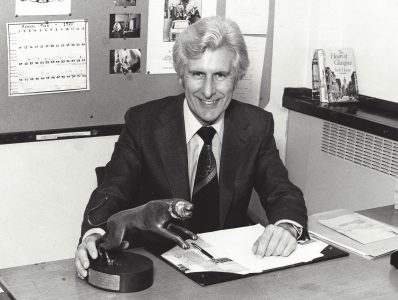Journalist, filmmaker, writer
Born: April 14, 1923;
Died: January 4, 2018
 James Allan Wilson, who has died from heart failure a few months shy of his 95th birthday, was a journalist, filmmaker and writer whose influence on the development of documentary filmmaking in Scotland inspired the Saltire Society to award him Honorary Membership in 2015.
James Allan Wilson, who has died from heart failure a few months shy of his 95th birthday, was a journalist, filmmaker and writer whose influence on the development of documentary filmmaking in Scotland inspired the Saltire Society to award him Honorary Membership in 2015.
Born in Edinburgh, the young James “Jim” Wilson attended George Watson’s College, his parents James and Euphemia (nee Allan) hoping for a career in the Civil Service. Young Jim, though, had other ideas; not yet 16, he successfully sold several articles to the Edinburgh Evening Dispatch, researching the history of the Scottish capital using, among other volumes, the school library’s copy of James Grant’s “Old and New Edinburgh”. He invested some of his fee in buying his own copy.
Later Jim attended the Edinburgh Skerry’s Commercial College, where he gained Royal Society of Arts certificates in shorthand and typing, before joining The Scotsman in 1939, initially as a copy boy and trainee reporter.
His journalistic career was interrupted by the Second World War. Despite reservations, he enlisted in 1942, training as a radio operator with the Royal Corps of Signals and serving in India, Burma, Malaya and Java. Awarded the Burma Star, he was “demobbed” in 1946 having gained the rank of Sergeant. Like many of his generation, Jim seldom ever spoke of his wartime experiences.
Returning to The Scotsman, which had held his job open for him, he made speedy progress up the journalistic ladder, becoming a senior reporter, subeditor and features writer. His focus was motivated, at least in part, by a sense of having lost time thanks to the War, but he also now had practical responsibilities at home. In 1948 he had married the journalist Jean Jamieson Whitehead; their first son, Allan, was born the following year.
By the early 1950s, Jim had become The Scotsman’s film critic, following in the footsteps of eminent writer—and fellow active member of the Edinburgh Film Guild—Forsyth Hardy. During this time he met and interviewed many British film and Hollywood greats, while chairing events about documentary films at the Edinburgh International Festival. He also reviewed radio and theatre, while becoming The Scotsman’s first ever television critic once regular broadcasts by the BBC Television Service commenced in central Scotland in February 1952.
Three years later Jim’s genuine interest in the potential of broadcasting, both sound and vision, took him to the BBC’s newsroom in Glasgow; while his initial training was in radio broadcasting, the team was also responsible for BBC Scotland’s short television bulletins and he appeared frequently on-screen. In 1959, Jim’s growing experience as a script writer and producer took him and his family up to Aberdeen, where he was charged with establishing regular television broadcasts—including news programme Talk of the North—from the BBC’s new premises on Beechgrove Terrace.
Despite the early workload, Jim still found time to squeeze in writing the second of two novels published by Hutchinson of London: Straw in the Wind, published in 1960, explored Jim’s passion for early aviators. His debut novel about military action in Cyprus, Interrupted Journey, had appeared two years earlier.
In 1968 Jim returned to Glasgow, working in the BBC Scotland Documentary Unit alongside W Gordon Smith and Murray Grigor. He became a major contributor of “current affairs”-styled culture programmes to the BBC’s Tuesday Documentary strand during the 1970s, writing, sometimes-directing and produced films on subjects as diverse as the pioneering town planner Sir Patrick Geddes and the world’s first supertanker. In the process he worked with a generation of great Scottish actors including Fulton Mackay, Iain Cuthbertson and Leonard Maguire—the latter playing Geddes in Jim’s 1970 film, An Eye for the Future.
Jim long believed that Scotland’s major contribution to cinema had been in developing documentary filmmaking. If the form had fallen from grace in cinemas, Jim helped it find a new home on Scotland’s TV screens. As the artist Kenny Munro wrote in 2014, Jim’s talent was “applying journalistic research and his imagination to communicate many aspects of Scottish affairs… addressing its significance to contemporary audiences.”
Jim Tough, executive director of the Saltire Society, went further in 2015, saying: “In a career spanning more than 50 years, there is no doubt that Jim Wilson has had a determining influence in shaping 20th century Scottish documentary making and paving the way for its transition to the 21st century digital age.”
The latter is, in part, down to Jim’s role as the final Director of the Films of Scotland Committee. Established in 1955 “to promote, stimulate and encourage the production of Scottish films of national interest”, the Committee was, by the early 1980s, decidedly out of step with the free-market ethos of Thatcher’s Britain. Having by now left the BBC to go freelance, Jim found himself charged with the sad task of winding up the body his old friend Forsyth Hardy had started. His most significant contribution was undoubtedly ensuring that all the Committee’s films and associated documentation were donated to the National Library of Scotland, essentially forming the core of the Scottish Screen Archive, now open to the public in its new home at Kelvinhall, Glasgow.
Jim’s wife Jean pre-deceased him; he is survived by his sons Allan and Andrew and their partners, grandchildren Jamie, James and Scott, and great-grandchildren Archie and Annabelle.